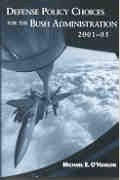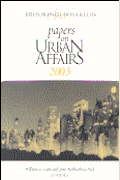In week eight of Donald Trump’s presidency, Republicans unveiled a replacement for the Affordable Care Act, the White House enacted a new executive order on refugees and immigration, and North Korea rattled its neighbors once again. Here’s a St. Patrick’s Day update on what Brookings experts are saying in the first 100 days about the Trump administration’s policy choices, personnel decisions, and engagements with global and domestic events. To receive daily updates on new Brookings research, commentary, and events, subscribe to our newsletters.
Read what Brookings experts had to say about the First 100 Days in: Week Seven | Week Six| Week Five | Week Four | Week Three | Week Two | Week One.
ON PRESIDENT TRUMP’S FIRST BUDGET PROPOSAL
Senior Fellow David Wessel, director of the Hutchins Center on Fiscal & Monetary Policy, offers a first look at the Trump administration’s “skinny budget” proposal, noting that “By focusing exclusively on shrinking the one-sixth of federal spending that is annually appropriated for non-defense programs, the president has forgone any effort to sketch an overall fiscal policy and missed an opportunity to learn (himself) or teach (the American people) some basic fiscal realities.”
Molly Reynolds, fellow in Governance Studies, looks at four points related to the new Trump budget, and says that while Congress has significant power in crafting and enacting the federal government’s budget, “this proposal should be taken seriously as an indicator of the direction in which he would like to steer the ship that is the discretionary side of the federal budget.”
Scott Andes, associate fellow with the Centennial Scholar Initiative, writes that “President Trump’s ‘America First’ budget blueprint would actually put U.S. manufacturers and the national economy well behind their global peers.”
Senior Fellow Mark Muro looks at the potential effects of eliminating three small regional development agencies, which he says “are each imperfect but meaningful components of the nation’s already emaciated efforts to catalyze economic renewal in hard-bitten regions.”
Alice Rivlin, senior fellow and founding director of the Congressional Budget Office, examines Trump’s bold budget proposal and its position within the larger political climate. Watch:
ON DOMESTIC & ECONOMIC POLICY
Vanessa Williamson, fellow in Governance Studies and author of the new book, “Read My Lips: Why Americans Are Proud to Pay Taxes,” calls the two pages of Donald Trump’s 2005 tax return “a poster child for the Alternative Minimum Tax,” and also “shows us why Trump must release his entire tax returns.”
Senior Fellow Bill Gale explains the Alternative Minimum Tax in the context of the release of some pages of Donald Trump’s tax returns.
Senior Fellow Henry Aaron examines the recent CBO report on the GOP health care plan, the American Health Care Act, and says that “that the AHCA could actually expand coverage, as Tom Price, secretary of Health and Human Services claims, is simply not credible.”
Alice Rivlin says that “President Trump is not the first incoming president to misunderstand the role of the CBO,” and that undermining the independent agency’s credibility “most harms not only Congress’ ability to do its job, but also the long-run effectiveness of both political parties in addressing the challenges that face our country’s future.”
Samantha Gross, fellow with the Energy Security & Climate Initiative, attended the recent CERAWeek energy conference in Houston (“the Super Bowl of the energy industry”), and observes that despite President Trump’s moves to roll back climate initiatives, “energy industry leaders are staying the course on low-carbon investments and strategies, both in the United States and globally.”
Lynn Broaddus and Joseph Kane of the Metropolitan Policy Program offer “five steps for cities and states to consider as they look to move beyond the status-quo and drive future water innovations, whether Washington takes action or not.”
Senior Fellow Phil Wallach, in a recent episode of the Brookings Cafeteria podcast, breaks down the regulatory process and considers the shape of regulation in the Trump administration.
ON FOREIGN & NATIONAL SECURITY POLICY
Senior Fellow Benjamin Wittes, also editor-in-chief of Lawfare blog, says that President Trump’s new executive order on travel from six majority-Muslim countries “is a much more defensible piece of work, and because it applies less broadly, it will be easier to defend in court.” Watch:
Senior Fellow Michael O’Hanlon reviews policy options for the Trump administration in Syria, including the liberation of ISIS’s Raqqa stronghold. O’Hanlon also says that replacing Syrian President Assad “does not seem to be in the cards” and “some form of self government for the Kurds and Sunni Arabs is the only realistic answer.”
O’Hanlon and Senior Fellow John Allen, former commander of the NATO mission in Afghanistan, argue for increasing the number of U.S. troops in Afghanistan by a third to one-half, and say that “the added capabilities could well spell the difference between stalemate and a gradual trend toward something resembling victory.”
Senior Fellow Thomas Wright likens Donald Trump’s foreign policy stance to Dr. Jekyll and Mr. Hyde, writing that “Dr. Jekyll may well be the everyday persona of the Trump administration’s foreign policy if the Cabinet can exert its influence, but ultimately Mr. Hyde will define it.”
Senior Fellow Steven Pifer describes some red lines that the Trump administration should draw for Vladimir Putin and Russia, including on NATO, nuclear weapons use, arms control commitments, and Ukraine. He writes that “if the United States makes clear it will enforce these lines, joined by NATO and the European Union, Russia’s leadership will have to take them into account in its decision-making.”
Pavel Baev, nonresident senior fellow in Foreign Policy, writes that Russian President Vladimir Putin may be patient with the Trump administration as the “whirlwind” of scandals blows over, but that “there’s a real risk that [Putin] will take a proactive stance and throw another of his trademark surprises.”
Senior Fellow Jonathan Pollack reports on how Donald Trump is approaching the presidency, particularly in international economics and national security policy, and with attention to the Korean peninsula. “Diligent, intensive security consultations and careful policy deliberation, not impulsive tweets,” he writes, “are essential for imparting to Pyongyang and to Beijing that the United States fully intends to uphold its security commitments in Northeast Asia.”
Geoffrey Gertz, post-doctoral fellow in Global Economy and Development, examines four broad options for investment protect in any renegotiation of NAFTA.”Trump’s insistence on renegotiating NAFTA,” Gertz writes, “is an opening to consider more creative and ambitious proposals.”
—
For more details policy recommendations and analyses from Brookings experts for the new administration, see “Brookings Big Ideas for America” on issues including the threatened middle-class dream in America, health care, criminal justice reform, infrastructure, U.S. alliances, nuclear weapons, terrorism, and regional conflicts.




Commentary
President Trump’s First 100 Days: What Brookings experts are saying, 3/17/17
March 17, 2017